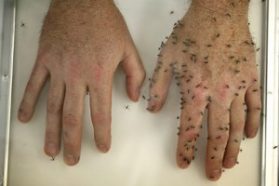Bug, bug, go away
News snapshot from Science News for Kids
Share this:
- Share via email (Opens in new window) Email
- Click to share on Facebook (Opens in new window) Facebook
- Click to share on X (Opens in new window) X
- Click to share on Pinterest (Opens in new window) Pinterest
- Click to share on Reddit (Opens in new window) Reddit
- Share to Google Classroom (Opens in new window) Google Classroom
- Click to print (Opens in new window) Print

Every summer, people all across the country take part in a nightly ritual: covering themselves with insect repellents to ward off bloodthirsty mosquitoes and other pests. It’s a good idea. Mosquitoes don’t just leave you with itchy red bumps after they bite. They can also transmit serious illnesses, such as West Nile virus and malaria.
Most bug sprays today contain a mosquito-repelling chemical called DEET. But DEET is both sticky and smelly — not the kind of stuff people enjoy spraying on their skin on a hot summer night. It also dissolves plastics and can irritate skin, so finding a DEET alternative has long been a goal of many researchers.
The challenge has been finding a compound that’s just as effective as DEET at keeping the bugs away, yet lasts a long time. Many insect repellents quickly become ineffective because they evaporate, are absorbed by the skin or dissolve in sweat and water. Despite decades of hunting for new compounds, scientists still haven’t found any that keep the bugs at bay as long as DEET.
Now, a team of researchers has identified a group of 23 compounds that not only keep mosquitoes away, but also last much longer than DEET — in some cases more than three times longer.
The scientists made their discovery by first identifying 150 chemicals known to repel bugs. Then, they entered the chemical structure of each of those chemicals into a computer program. With this information, the scientists taught the computer to spot compounds with the chemical characteristics common to those that repel insects. Next, they used the program to analyze 2,000 varieties of an insect-repelling compound found in black pepper. After sorting through all 2,000, the software program highlighted 23 previously unknown candidates as possible mosquito repellents, based on the candidates’ chemical structure.
Next, the research team tested how the 23 new compounds performed in experiments on people, against actual insects. The researchers applied cloths containing the compounds to the outside of thick gloves worn by human volunteers and measured the length of time before each cloth lost its ability to shoo away mosquitoes. To the researchers’ surprise, some compounds lasted as long as 73 days. When tested using this method, DEET only lasted for 17 days, the researchers noted.
The compounds aren’t likely to last quite that long when applied directly to skin, the researchers note. DEET, for example, only remains effective for about five hours on the skin, as compared to 17 days on cloth. Still, the compounds may offer promising new alternatives for the military, which provided the funding for the study. “You don’t want your soldiers reapplying every 15 to 20 minutes,” said Ulrich Bernier, a chemist with the U. S. Department of Agriculture who helped identify the new compounds.
Power words:
DEET: The common name for a chemical called n, n, diethyl-meta-toluamide. The U.S. Department of Agriculture discovered the chemical’s insect-repelling properties in 1953.
Malaria: A disease caused by a parasite that is transmitted through mosquito bites. Malaria, which is most common in tropical climates, causes chills, fever and sweating.
Repellent: A substance that drives away insects or other pests
West Nile virus: A disease caused by a virus that lives in the blood of birds and other animals. It is transmitted to humans through mosquito bites. West Nile virus can cause a very serious illness marked by fevers, weakness, vision trouble and even paralysis.







